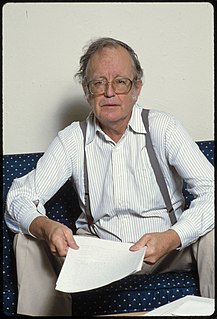A Quote by William Butler Yeats
Being Irish, he had an abiding sense of tragedy, which sustained him through temporary periods of joy.
Related Quotes
Joy is not the same as pleasure or happiness. A wicked and evil man may have pleasure, while any ordinary mortal is capable of being happy. Pleasure generally comes from things, and always through the senses; happiness comes from humans through fellowship. Joy comes from loving God and neighbor. Pleasure is quick and violent, like a flash of lightning. Joy is steady and abiding, like a fixed star. Pleasure depends on external circumstances, such as money, food, travel, etc. Joy is independent of them, for it comes from a good conscience and love of God.
I'm Irish as hell: Kelly on one side, Shanley on the other. My father had been born on a farm in the Irish Midlands. He and his brothers had been shepherds there, cattle and sheep, back in the early 1920s. I grew up surrounded by brogues and Irish music, but stayed away from the old country till I was over 40. I just couldn't own being Irish.
If people knew what Matisse, supposedly the painter of happiness, had gone through, the anguish and tragedy he had to overcome to manage to capture that light which has never left him, if people knew all that, they would also realize that this happiness, this light, this dispassionate wisdom which seems to be mine, are sometimes well-deserved, given the severity of my trials.
The Holy Spirit gives us joy. And he is joy. Joy is the gift in which all the other gifts are included. It is the expression of happiness, of being in harmony with ourselves, that which can only come from being in harmony with God and with his creation. It belongs to the nature of joy to be radiant; it must communicate itself. The missionary spirit of the Church is none other than the impulse to communicate the joy which has been given.
The sense of tragedy - according to Aristotle - comes, ironically enough, not from the protagonist's weak points but from his good qualities. Do you know what I'm getting at? People are drawn deeper into tragedy not by their defects but by their virtues. ... [But] we accept irony through a device called metaphor. And through that we grow and become deeper human beings.






































